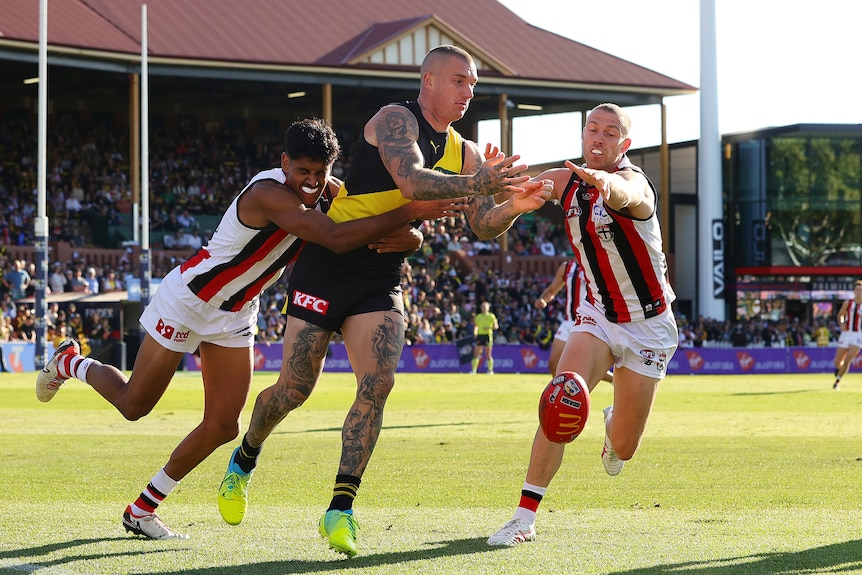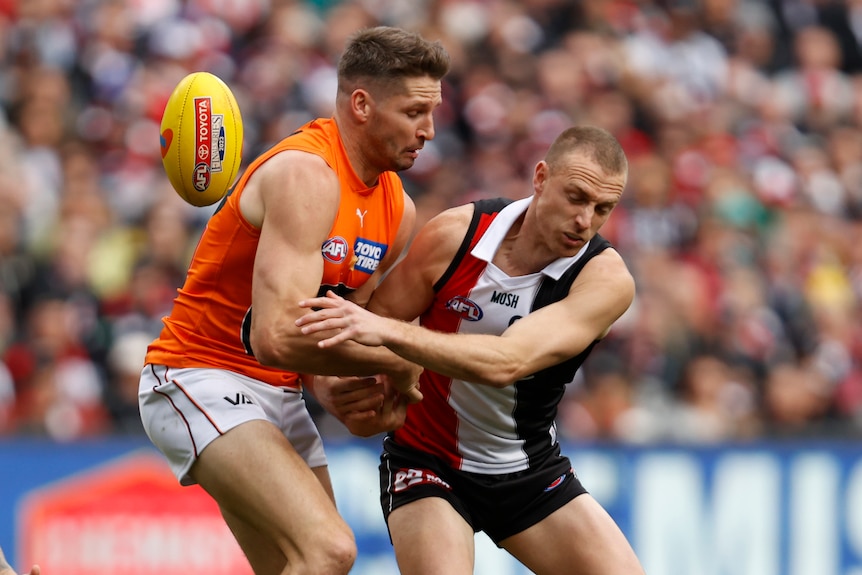The road to AFL success is often littered with early failures and obstacles. No two journeys to the highest level are the same.
Last year’s Australian team was packed with stars of the modern game, hailing from and representing all corners of the country.
A player could have taken the longer route to get to that stage and claim the jacket.
“It was quite, quite surreal being alongside some of the players up there. You know, Tom Stewart, five-time All Australian, one of the all-time greats.”
St Kilda’s Callum Wilkie has taken nothing for granted in his career. The 28-year-old Australian was humbled by the All Australian honour, one of only 24 mature-age draft picks (20 years or older) to earn the nod since 1993.
The St Kilda vice-captain also realized that it was just a small step on the road to ultimate success.
“It was a nice honour, but you know, it’s a thing of the past now,” Wilkie told ABC Sport last week.
“You just think, ‘How can I make the team better?’ and get the results you want.”
Wilkie’s journey from a mature, under-the-radar rookie to one of the most reliable and consistent defenders of the century so far challenges the conventional narrative of football’s byways and factories.
Noted author Victor Hugo once wrote: “Perseverance, the secret of all triumphs.”
Perseverance could simply be Callum Wilkie’s middle name.
The year of the draft
Wilkie’s rise to the top might not have happened without his stint below.
In 2014, South Australia won the AFL Under 18 National Championship, triumphing over traditional foes Victoria Metro in the final game.
Wilkie was a staple on that side, but not in the role we know him for now.
Wilkie played much of his youth football as a key forward, a spearhead rather than the one who had the role of stopping them. The North Adelaide product started the listed championships at full forward before dropping back as the tournament progressed.
“I was really tall when I was young, so I played as a half-forward when I was about 15,” Wilkie said.
Twelve members of that victorious South Australian team were chosen in that year’s draft, but Wilkie’s name was not on the lips of recruiters, which was no great surprise to Wilkie.
“I mean, I spoke to three or four clubs [but] I didn’t have a great year that year and… I was disappointed,” Wilkie said.
“Like any other kid that comes through the system, you want to play in the AFL. “It was a dream for a long time and I had a couple of years before that where I was really good and wanted to go on and play in the AFL.
“Obviously it hurts, but we have to move on.”
Despite his teams’ success, the numbers were as stacked against Wilkie as any junior player.
The system is an anguish machine.
Take last year as an example. At the national level there were around 27,000 17-year-old soccer players. Approximately 1,700 played elite under-18 representative football. Around 160 played in the Under 18 National Championship.
Only 61 were selected last year in the AFL Draft or Rookie Draft. That’s about 0.2 percent of the 27,000 players.
Those numbers illustrate how difficult it is to get to the AFL. But missing the cut isn’t always the end of the story.
It certainly wasn’t for Callum Wilkie.

Wilkie did not leave football. Instead, he returned to North Adelaide and tried to rediscover that joy for the game.
“I just got back to enjoying playing soccer with my best friends at North,” he said.
“Then Josh Carr came in.”
That process didn’t happen overnight: Wilkie said it took him a year or two to refocus after being ignored. Wilkie, like many other 18-year-olds, moved on with his life.
Still, there’s a reason Wilkie is where he is now. He credits then North Adelaide senior coach and current Port Adelaide assistant Josh Carr for getting him to where he is today.
“Josh was pretty determined for me to be a defender and he saw that in me from the beginning,” he said.
“He had a lot of confidence in me playing my game and probably really sparked my dream of playing there when I gave up.”
“From the moment he said that to when I got picked, I owe him a lot. I always give him credit when I do interviews because I don’t think I’d be playing in the AFL if it wasn’t him.”
By 2018, Wilkie had become the North Adelaide SANFL premier team’s best and fairest player and one of the brightest lights outside the AFL system.
By then, it was finally time for Wilkie’s draft.
Wilkie’s playing style
Doing the AFL is one thing. As noted above, approximately one-third of all recruits fail to play a game.
Wilkie, since his debut, has managed to play 114 consecutive games. He is a St Kilda record holder and good for fifth debut streak of all time.
Being a top-class tall defender in the modern AFL also requires a lot of work and a lot of preparation.
More importantly, you need to be able to know yourself, your strengths and your weaknesses.
“You’ll figure out what works best for you as a player and as a defender to be able to impact those positions,” Wilkie said.
“I’m not the biggest key defender out there, I’m the smallest. So it’s important to figure out what works for me.”
Wilkie is one of the best at knowing when to engage his opponent and when to break away to play the role of interceptor. El Santo is one of the best in the league when it comes to reading the flight of the ball and the tone of the play.
Wilkie believes the positional versatility of his youth has helped him read the game better as it develops.
“There’s no doubt that’s been very helpful to me: being able to play on both ends of the field,” he said.
“And I think probably more developed…a little bit later, when I realized I stopped growing. They all surpassed me and I had to find a way to beat them.”
By preparing week after week, Wilkie balances the team he is about to face, the team’s overall game plan, and his natural strengths as a player.
“[I’m] Always looking at what the opposition’s strengths are and their individual strengths and how they like to play and how they change the competition. So you try to find that balance,” Wilkie said.
“It changes a little bit from week to week, but mostly you try to remember why you’re a good player.”
That self-confidence, faith and hard work are key to staying on top at AFL level.
After a poor game against Essendon, Wilkie recognized the steps needed to get his game back up to par against Richmond the following week.
“Coming to Richmond I worked a lot with a lot of the other riders, [defensive assistant coach] Corey Enright and [development coach] Jake Batchelor during the week. I just go back to what my best position is and work a lot on my hands,” Wilkie said.
“I saw some pictures of how I got back to my best level. The main thing is the body. Then I went out to the park and hit high balls and putts in my hands. Just to feel the confidence of those reps.”
The results spoke for themselves. Wilkie made five interceptions in the final quarter and 2 minutes of the game, setting up the game-sealing goal.
That offensive part of his game is often underrated, but he is considered one of the league’s best key position defenders using the ball.
Despite all the preparation, some parts of the defensive process have to come from instinct.
“I think the main thing in competitions is being able to play in the drop zone as quickly as possible. Then you can deal with it if you know you can hold on,” Wilkie said.
“It’s funny, it’s something I can’t always express very well in terms of what goes through my process. It just happens.”
Wilkie is also often tasked with playing the “alpha” role in the Saints’ defense. The alpha usually sits on the line between the ball and the goal, guessing the situation around him, with a deeper kick than a traditional backup defender.
The alpha has to be aware of every element of the game that is taking place; of rapid increases and sudden profits. Like a rugby league defender, the alpha has to move, adapt and communicate with the rest of the defense around him.
Wilkie’s involvement in this role generally escapes traditional statistical measurement, but he has contributed heavily to St Kilda’s stellar defense in recent years. That included last year, when they paced the league with a series of defensive moves.
Any success the Saints are likely to see this year will be built from behind.
As one of the Saints’ leaders, Wilkie has his sights set on next season’s hopes.
“For the team it’s just constant improvement. You know you never want to get stuck in this game. The game will pass you quickly,” he said.
“We have a lot of young players and we have a good mix of growth. I feel like we are building a special brand and culture at this club and that’s where my role as a leader comes into play: it’s just support that and help everyone grow and just Help everyone be better as a team.
“We just want to fine-tune that system and be the team we want to be. You know, that’s obviously playing finals. We want to be there.”
Wilkie’s long road to becoming one of the sport’s greatest advocates required years of perseverance, effort and dedication to get here.
Sports content to make you think… or allow you not to. A newsletter delivered every Friday.


